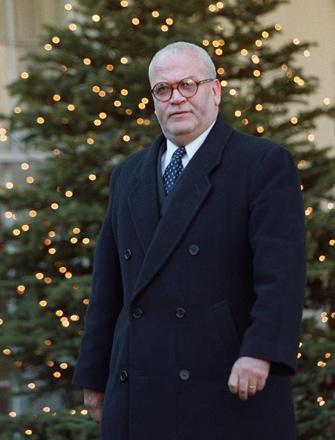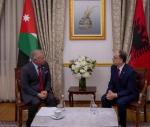You are here
Palestinians bury veteran negotiator Saeb Erekat
By AFP - Nov 12,2020 - Last updated at Nov 12,2020
JERICHO, Palestinian Territories — Palestinians on Wednesday buried their veteran negotiator Saeb Erekat, who died aged 65 of coronavirus complications, amid cautious hope the stalled peace process with Israel may be revived under Joe Biden's presidency.
Erekat, who passed away on Tuesday in Israel at Jerusalem's Hadassah Ein Kerem hospital, earned praise from leaders around the world for his enduring belief that negotiations could end the Middle East conflict and lead to the creation of a Palestinian state.
Palestinian President Mahmud Abbas, who lauded Erekat as a "great fighter" for his people, hosted an official memorial ceremony at his presidential compound in Ramallah in the Israeli-occupied West Bank.
Palestinian Foreign Minister Riyad Al Maliki described Erekat as "an icon of the Palestinian cause".
Erekat, secretary general of the Palestine Liberation Organisation (PLO), was a lung transplant recipient who suffered from pulmonary fibrosis.
After contracting the novel coronavirus, his prospects for recovery were dim given his history of respiratory illness.
Following the sombre military ceremony attended by top officials of the Palestinian Authority, Erekat’s body was driven to his home city of Jericho.
It was met at a Jericho mosque by hundreds of well-wishers, most of whom wore masks to protect against the virus, before proceeding to a cemetery near his home for burial.
At the tree-lined graveside, PLO executive member Taysir Khaled said the Palestinian people had “lost a great national figure”.
Erekat was part of nearly every major peace negotiation with Israel and a close confidant of late Palestinian leader Yasser Arafat, who agreed the historic Oslo accords with former Israeli prime minister Yitzhak Rabin.
Palestinians on Wednesday were also marking the anniversary of Arafat’s death in 2004, a year that saw the peace process left in ruins by the bloodshed of the Second Intifada, or uprising, and deadly Israeli reprisals.
Neither Israel’s right-wing Prime Minister Benjamin Netanyahu, nor President Reuven Rivlin offered public condolences following Erekat’s death, underscoring the soured relations between Israel and Palestinian leadership.
But Palestinian analyst Nour Odeh told AFP that up to his death, Erekat “was always hopeful, always believed [peace] is achievable”.
She said he “would have rejoiced” at the election defeat of United States President Donald Trump, seen by many Palestinians as a blatantly pro-Israeli obstacle to peace.
‘End of an era’
Erekat watched despairingly as the two-state solution he had long championed faced mounting obstacles.
Those included the collapse of peace partners on the Israeli left as the country lurched to the right under Netanyahu, and persistent illegal housing units expansion in the occupied West Bank.
Israelis point to Palestinian violence, divisions and lack of political will as main obstacles to negotiations.
Robert Malley, head of the International Crisis Group think tank, said, “Erekat’s death marks the end of an era.
“An era in which Israelis and Palestinians sought to negotiate a peaceful solution to their conflict. He embodied that era, with all its hope and all its frustrations.”
Hope with Biden?
Under Trump, Palestinians charged that Washington abandoned its role as a legitimate arbiter in the conflict.
The Republican president recognised Jerusalem as Israel’s “undivided capital”, an existential blow to the Palestinians, who claim the eastern part of the city as the capital of their future state.
By the time of Erekat’s death, relations between Washington and the Palestinian Authority had effectively collapsed.
Trump’s controversial Middle East plan, drafted with no Palestinian input, was categorically rejected by Ramallah.
“Joe Biden is not Donald Trump so we expect sanity in the White House, civility, more balance,” Odeh said, adding that there was “measured optimism” among Palestinians about the prospects for cooperation with the Biden administration.
Commenting on Erekat’s death, United Nations Secretary General Antonio Guterres said, “Now is the time to continue his crucial work,” by renewing negotiations towards a “just and sustainable two-state solution”.
Related Articles
RAMALLAH, Palestinian Territories — Saeb Erekat, who died on Tuesday at the age of 65, weeks after being hospitalised with COVID-19, was the
For decades, Yasser Arafat was the incarnation of the Palestinian fight for independence. Ten years after his death, he remains a national hero for a still stateless people.
JERICHO, Occupied West Bank — The United States will not present its long-awaited plan for Israeli-Palestinian peace any time soon and is in


















